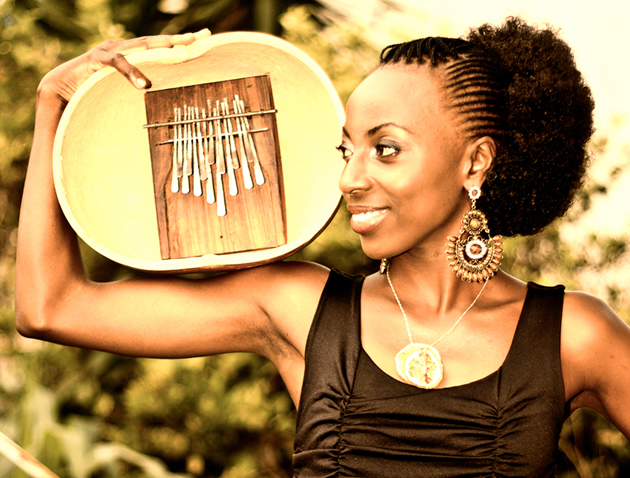There’s more to love than Valentine’s Day


Love is a verb, it is expressed through action. Not simply the action of buying chocolate, flowers or taking someone out for a nice meal over candlelight one day of the year . . .
Blessing Musariri Shelling the Nuts
The history of it is not exactly hearts and roses as I recall, but these days it means a week or so of heightened expectations and seeing too much of the colour red.
I suppose there is something of an anarchist in me because every time these festive days come up I feel every question about the evolution of these celebrations rise up to challenge what we have come to mark on our calendars as standard.
Why should there be a day when I am expected to do a certain thing, to express a certain emotion, to be part of rituals that don’t have real meaning to me? Of course, if someone sees fit to send me chocolates and flowers I won’t object, but I’d like them to not have to wait until a certain day to do so.
Feel free to do this any time. However, this freedom may not necessarily apply to all. So okay, I may rant about it like I rant a little about Christmas and every other day when I’m commercially obligated to express a sentiment along with the rest of the world, but I suspect my actual problem with all these days is the expectations they raise.
As a teenager, it was fun to anticipate Valentine’s Day and try to imagine which boy would step up and declare his affections.
Often times, the results were somewhat disappointing because as is par for the course with teenage romance, the path to one’s true love is littered with inconvenient competition, unrequited feelings and other unnecessary complications.
Take Romeo and Juliet for instance, my question has always been, why didn’t the priest send Romeo’s cousin with the message in the first place, instead of sending a letter outlining his plan, or was it the apothecary – at this point I confess to having watched the Baz Lurhman screen adaptation and not read the actual play (judge not lest you be judged).
I assume the actual play was not too different and if it was then I suggest you watch the movie, which is still an all-time favourite of mine and then we’ll all be on the same page – so to speak.
The bottom line is that if things had worked out well then I suppose it would not have been the tragedy it was designed to be, and why is it that love and tragedy are such close companions?
At a writing workshop for school kids last year, I gave an option of four topics for a flash fiction exercise and almost all the stories the students wrote dealt with two of the four themes and those were love and suffering. Disturbingly enough the stories dealing with love automatically included suffering.
I expressed my concern that this seemed to be the prevailing sentiment: love equals suffering. Is this a universal truth or is this what our children are learning from what we are living? They say children live what they learn, this means we all need to question ourselves as life lesson-givers.
When it came to the poetry (back at the workshop), it was no better, most of it dealt with themes of betrayal, lost love, and various forms of abuse.
I had to focus on the talent rather than the enormous hopelessness I had begun to feel. These were 16- to 19-year- olds, who were writing about adult love gone wrong. There wasn’t a single happy story about two people showing love and respect to each other. Not one. The other stories dealt with money blues and one, which was a breath of fresh air, dealt with the suffering induced by the pressure of a deadline.
At this point I feel I must put in a disclaimer, I did not choose the topics, I asked the participants to nominate the four topics. Perhaps next time I will simply dictate the terms of engagement and choose happier themes. However, what this shows me is that the state of our unions is not healthy.
I recently read a post on actor Liam Neeson’s social media page that made more than enough sense: “Everyone says love hurts, but that is not true. Loneliness hurts. Rejection hurts. Losing someone hurts. Envy hurts. Everyone gets these things confused with love, but in reality love is the only thing in this world that covers up all pain, and makes someone feel wonderful again. Love is the only thing in this world that does not hurt.” So what have we been doing all these years that our children equate love with suffering?
Is it maybe that there is an ideal created around the word love? We all hurt people we love, unintentionally and/or through our personal shortcomings, but when the hurt causes protracted suffering and one makes no move to amend their actions, can they still say they love you? I think at this point it might be more enlightening to ask the question, what is love?
In the Christian Bible 1 Corinthians 13 lists many attributes of love . . . “love is patient, love is kind . . .” and so on. But what I think this list tends to do, is to give people the impression that love is an entity that contains all these things but remains an ideal to strive towards, possibly an unattainable one, so it is okay if we try and fail because this is equal to trying to be Jesus and after all, Jesus walked on water.
It is a good list to keep in mind, however, but the most useful guidance about love, in my opinion, is that love is a verb, it is expressed through action. Not simply the action of buying chocolate, flowers or taking someone out for a nice meal over candlelight one day of the year – although don’t let this stop anyone from including these things in their action of showing love – but the act of doing things that show you care about how someone else is feeling, that you care about their happiness.
I don’t want to give the impression here that I believe a person’s happiness depends on another person but certainly when someone cares about how their actions and behaviour is affecting the person they are next to, then it makes all the difference in the world.
This applies to all love and not only romantic love. Love may be patient and kind and a host of other things, but it needs to be nurtured and in order for those things to stay present and thrive, otherwise it cannot survive, and this takes work.
When a man or woman looks at their partner one day and says, you’re not the person I fell in love with, it is usually said by way of excusing themselves for no longer feeling the way they felt when they first met. The thing is, this holds no water as an accusation because that it is a simple truth. No one stays the same one day through to the next, we are constantly growing, changing, adjusting and learning new ways of being in each other’s presence.
If 10 years down the line I am the same person you met then there is cause for concern. It means I have not grown. I have remained unchanged by my experiences and I have probably learnt nothing new. Of course, I am not the person with whom you fell in love. I am the person to whom you committed and entrusted the growth of that first spark of love and I cannot keep that spark alive without your help.
The trick to love is knowing when it is actually love and not something else. Sometimes men will say, “I love you”, as a pick-up line. Of course, this is nonsense. How can you love someone you have just met and don’t know? Love at first sight? Possible, but unlikely. Of course, it is entirely possible to meet and have an immediate connection with someone but whether or not it stands the test of time is something else.
Love can be complicated, in fact, it very often is. They say love is blind, I say love has eyes wide open but going ahead anyway because you know the flaws you see will never be larger than the feeling.
Does it need to make sense? Does it need to be rational? I don’t know. I leave you to attempt a definition: fill in the blank space and share your thoughts with someone you love – Love is . . .







Comments